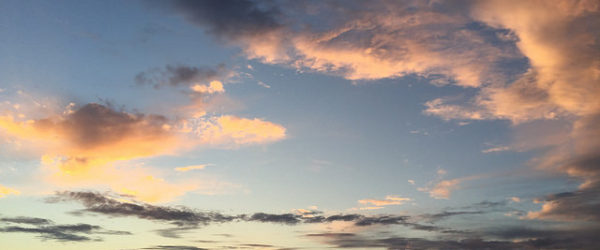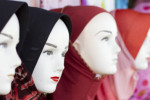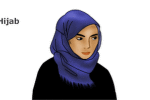This has been my first Ramadan without hijab since 1997. After wearing hijab for close to twenty years, last year, sometime in August, I finally started leaving the house every day without covering my hair. I say “sometime” because removing it was a gradual process. At some point that summer, when the last distant cousin found out, I realized I had done what I had been thinking about for so long. And at some point this Ramadan, this time of family-gathering and mosque-going and Quran-reading, I realized that I haven’t stopped thinking about what this decision means.
I chose to remove the hijab. Did I choose to wear it? That is not as clear-cut as some make it out to be. The hijab just was: it was a phase in my development; it was assumed this was what I would do when the time came. I was ten years old when it happened, it being my first period. The next morning, my mother taught me how to wrap the hand-me down scarf that my sister did not want anymore. I remember feeling uneasy, and that uneasiness worsened when I got to school and confused students (and teachers) asked if I had been to Mecca. I was the only one in that school to wear a headscarf.
For years, I accepted the hijab. It became part of me, the thing that made me most different. Even when I started going to another school where there were other girls in hijab, I was different. Hijab, according to my family, meant jilbabs, never jeans, and no colors except brown, black, and grey. I wore large headscarves that were pinned under the chin rather than stylishly wrapped shaylas and dupattas. Unsurprisingly, I was bullied. The thing is, back then I can’t remember thinking about taking it off. The bullying made the hijab even more a part of who I was. Why should I try to please “them”, after all? It was probably during this time that I owned being a hijabi most.
And then something changed. I started to doubt the idea that wearing hijab was a religious duty, and that Muslim women who did not wear it were superficial and sinful. It was the focus on the hijab, as though piety was all about the external, which seemed to me the epitome of superficial. I started to resent the double standards of the Muslim community around me at the time, where men freely spoke with women (under justifications of dawah and thinking-of-polygamy) but would be outraged if their wives exchanged a word with a non-mahram man. Growing up in this environment, I had taken it for granted that men went to mixed-gender gyms and swimming pools and forbade these spaces to women, and that men dressed for comfort in the summer while women covered up in stifling layers (and wore men’s socks because women’s socks were too transparent!). But somewhere along the line all of this started to enrage me. And enrage is not too strong a word.
I became aware that I was not happy wearing the hijab, that I maybe had never been happy wearing it, and that I had kept wearing it simply because it was the path of least resistance. And maybe I wouldn’t be any happier not wearing it…but didn’t I owe it to myself to find out?
I don’t want to downplay how difficult it was to decide to take it off. I’ve read too many “dejabbing” stories that focus only on the personal and spiritual aspects, and I would think: Their circumstances are different. Their families are different, less conservative, less strict, than my family. At least half of what held me back was fear of what people would say and do. That, in itself, told me what I needed to know. What was the point of this if I was doing it only for others rather than for God?
I looked for practical advice. How do you actually take this step? How do you say the words? I found very little. There was some material by an ex-Muslim woman that was helpful, but it only seemed to confirm what my family would say: if you take it off, you are not Muslim.
I wavered, wrestled with doubts, read arguments for and against, and watched endless videos of Muslimahs talking about why they could never take off their hijab. Many of these accounts are unfortunately given the click-bait title “Taking off the hijab,” so those who are seeking advice find themselves shamed for even thinking of taking this step. And watching these self-assured hijabi women did feed the shame that I already felt. I would think: Look at this woman with her successful life proudly wearing her hijab. Am I ashamed of my religion? Why am I giving up this part of me? Why am I weak? Looking back on it now, I think this was my attempt to go back to being the good hijabi. I ignored the other voice that reminded me there would be nothing weak about taking this step, that I’d worn the hijab from the age of ten to the age of thirty simply because it was what was expected of me, because it was easy to be obedient, to do the expected.
In the end, I decided I might regret the decision to stop wearing the hijab, but I would regret it more if I never decided, finally, to choose for myself. Once I made the decision, taking it off was easy, even though the aftermath was anything but. To make a long story short, it was more or less what I expected: I was lectured, shouted at, told I was weak and cowardly and ungrateful, and had someone who was once close to me express their disgust by spitting at me. But I burned some bridges, and survived.
This Ramadan, a year later, I’ve been trying to balance the choice against the lingering regret. Because sometimes I do regret removing the hijab. I miss being the good obedient hijabi daughter, I miss being the visibly identifiable Muslimah, the sister greeted with salaam on the streets. And all of that regret was intensified this Ramadan, when community and family matter more than ever, and when not wearing hijab means being barred from the religious spaces around me. For many, I have become that superficial, sinful woman they warn their daughters about, the one who cares more about this world than the next. I haven’t been to the mosque this Ramadan, because I don’t know how to negotiate wearing hijab to avoid confrontation.
A year on, it is still strange, feeling the wind in my hair and the sun on my neck. A year on, there are still days when I wish I could undo what I have done, just to be more accepted, just to fit into my community more easily. Part of me even misses being the outsider, the non-conforming religious woman in a secular society. Hijab defined me for twenty years. But one year on from removing it, I am more myself now than I was then. I don’t struggle to convince others to believe in something I don’t myself believe in, and I don’t instinctively lie about my life in the hope that others will have a better image of my religion. Back then, I was at once bristlingly defensive and doubtful. Now, I no longer feel like a hypocrite, like one thing on the outside and another on the inside. I am more honest with myself, and more true to what I believe.
Making your own choices in life, it turns out, is worth something. Regret may be part of choice, but so is self-respect.




